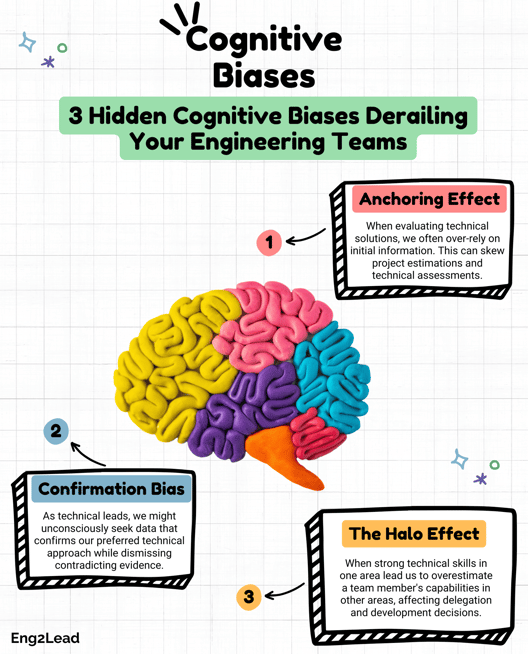Cognitive Biases and Mind Traps Explained
Looking back at my journey from engineer to leader, these cognitive biases weren't covered in any leadership training - yet they impacted nearly every decision I made. Here's what I learned the hard way:
WORK PSYCHOLOGY
Gilmar Pereira
11/8/20241 min read


5 Mind Traps I Wish Someone Had Warned Me About!! 🧠
The Anchoring Effect Problem:
Your team's initial solution becomes the reference point for all alternatives.
Impact: Skewed project estimates, missed innovation opportunities Solution: Always evaluate multiple solutions independently before comparing them.
Confirmation Bias Problem:
Seeking data that confirms your preferred technical approach. Impact: Overlooked alternatives, resistant to new perspectives Solution: Assign "devil's advocates" in technical reviews, actively seek contradicting evidence.
The Planning Fallacy Problem:
Consistently underestimating project timelines and complexity. Impact: Missed deadlines, team burnout Solution: Add systematic buffers, use historical data for estimates.
The Halo Effect Problem:
Strong technical skills in one area lead to overestimating overall capabilities. Impact: Poor delegation, biased performance reviews Solution: Use structured evaluation frameworks, separate technical criteria explicitly.
Status Quo Bias Problem:
Sticking with existing solutions despite better alternatives. Impact: Technical debt, missed innovation opportunities Solution: Regular technology audits, structured innovation programs.
💡 Leadership Tip: Build these practices into your routine:
Document assumptions before technical reviews
Create psychological safety for challenging decisions
Implement structured decision frameworks
Maintain decision logs for pattern recognition
Interested in developing bias-resistant leadership practices? Let's connect for a discovery session to explore how coaching can enhance your decision-making toolkit.


